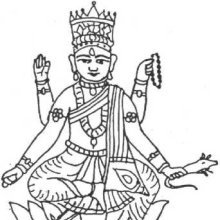Purushadatta, Puruṣadatta, Purusha-datta: 3 definitions
Introduction:
Purushadatta means something in Jainism, Prakrit, Hinduism, Sanskrit. If you want to know the exact meaning, history, etymology or English translation of this term then check out the descriptions on this page. Add your comment or reference to a book if you want to contribute to this summary article.
The Sanskrit term Puruṣadatta can be transliterated into English as Purusadatta or Purushadatta, using the IAST transliteration scheme (?).
Images (photo gallery)
In Jainism
General definition (in Jainism)
Source: archive.org: The Jaina Iconography1a) Puruṣadattā (पुरुषदत्ता) or Mahākālī is the name of the Yakṣī (Yakṣiṇī) accompanying Sumatinātha: the fifth of twenty-four Tīrthaṃkaras or Jinas, commonly depicted in Jaina iconography.—[...] Mahākālī of the Śvetāmbaras appears in her representation seated on a lotus with her four hands holding Varoda, noose citrus and goad. Puruṣadattā in her Digambara aspect rides an elephant and holds in her hands a disc, Vajra, fruit and Varada-mudrā. The attributes such as citrus, goad and, noose held by Mahākālī are symbolic of her Yakṣa character. Her other aspect represented by Puruṣadattā makes her half like a Vidyādevī and half like a Yakṣiṇī. Puruṣadattā as Vidyādevī is described as riding a cuckoo and holding a Vajra and lotus. In this case, her symbols of an elephant (Gajendragā), Vajra and citrus are those by which we recognise her as a Yakṣiṇī.
1b) Puruṣadattā (पुरुषदत्ता) also refers to one of the sixteen Vidyādevīs (goddesses of learning).—In Śvetāmbara literature, Puruṣadattā is differently described. In one aspect, she holds a sword and shield, in another, she rides on a buffalo and carries in her four palms Varada, sword, citrus and shield. The Digambara text makes her ride a peacockand hold as symbols vajra and a lotus. We meet with the Yakṣiṇī of the same description as the wife of Tumbaru, the attendant of Sumati. The buffalo vehicle indicates strongly the Vidyādevī’s original relation with the wife of Yama, who characteristically moves on the back of the same animal.
2) Puruṣadatta (पुरुषदत्त) is the name of the chowrie-bearer accompanying Śāntinātha: the sixteenth of twenty-four Tīrthaṃkaras or Jinas.—The cognizance which separates the image of Śāntinātha from those of other Tīrthaṃkaras is a deer. The Yakṣa and Yakṣiṇī attendants escorting him are respectively named as Kiṃpuruṣa and Mahāmānasī (Śvetāmbara: Garuḍa and Nirvāṇī). Rājā Puruṣadatta stands for his Chowri-bearer. The tree under which he attained the Kevala knowledge is Nandi Vṛkṣa.

Jainism is an Indian religion of Dharma whose doctrine revolves around harmlessness (ahimsa) towards every living being. The two major branches (Digambara and Svetambara) of Jainism stimulate self-control (or, shramana, ‘self-reliance’) and spiritual development through a path of peace for the soul to progess to the ultimate goal.
Languages of India and abroad
Sanskrit dictionary
Source: Cologne Digital Sanskrit Dictionaries: Monier-Williams Sanskrit-English DictionaryPuruṣadatta (पुरुषदत्त):—[=puruṣa-datta] [from puruṣa] m. Name of a man, [Mudrārākṣasa]
[Sanskrit to German]
Sanskrit, also spelled संस्कृतम् (saṃskṛtam), is an ancient language of India commonly seen as the grandmother of the Indo-European language family (even English!). Closely allied with Prakrit and Pali, Sanskrit is more exhaustive in both grammar and terms and has the most extensive collection of literature in the world, greatly surpassing its sister-languages Greek and Latin.
See also (Relevant definitions)
Partial matches: Purusha, Datta.
Full-text: Kimpurusha, Garuda, Shantinatha, Nirvani.
Relevant text
Search found 3 books and stories containing Purushadatta, Puruṣadatta, Purusha-datta, Puruṣa-datta, Purusa-datta, Purusadatta; (plurals include: Purushadattas, Puruṣadattas, dattas, Purusadattas). You can also click to the full overview containing English textual excerpts. Below are direct links for the most relevant articles:
Jainism in Odisha (Orissa) (by Ashis Ranjan Sahoo)
Iconography of Jain Gods and Goddess < [Chapter 6]
Iconography of Sasanadevis < [Chapter 6]
Jain Remains of Ancient Bengal (by Shubha Majumder)
Saraswati < [Aug - Sept 1939]
